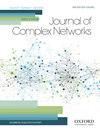Efficient link prediction model for real-world complex networks using matrix-forest metric with local similarity features
IF 1.5
4区 数学
Q2 MATHEMATICS, INTERDISCIPLINARY APPLICATIONS
引用次数: 2
Abstract
Link prediction in a complex network is a difficult and challenging issue to address. Link prediction tries to better predict relationships, interactions and friendships based on historical knowledge of the complex network graph. Many link prediction techniques exist, including the common neighbour, Adamic-Adar, Katz and Jaccard coefficient, which use node information, local and global routes, and previous knowledge of a complex network to predict the links. These methods are extensively used in various applications because of their interpretability and convenience of use, irrespective of the fact that the majority of these methods were designed for a specific field. This study offers a unique link prediction approach based on the matrix-forest metric and vertex local structural information in a real-world complex network. We empirically examined the proposed link prediction method over 13 real-world network datasets obtained from various sources. Extensive experiments were performed that demonstrated the superior efficacy of the proposed link prediction method compared to other methods and outperformed the existing state-of-the-art in terms of prediction accuracy.基于局部相似特征的矩阵森林度量的复杂网络链路预测模型
复杂网络中的链路预测是一个非常困难和具有挑战性的问题。链接预测试图基于复杂网络图的历史知识,更好地预测关系、互动和友谊。目前存在许多链路预测技术,包括共同邻居、adam - adar、Katz和Jaccard系数,它们利用节点信息、本地和全局路由以及先前对复杂网络的了解来预测链路。这些方法被广泛应用于各种应用,因为它们的可解释性和使用的便利性,而不管这些方法中的大多数是为特定领域设计的。本文提出了一种独特的基于矩阵森林度量和顶点局部结构信息的复杂网络链路预测方法。我们在13个来自不同来源的真实网络数据集上对提出的链路预测方法进行了实证检验。大量的实验表明,与其他方法相比,所提出的链路预测方法具有优越的效果,并且在预测精度方面优于现有的最新技术。
本文章由计算机程序翻译,如有差异,请以英文原文为准。
求助全文
约1分钟内获得全文
求助全文
来源期刊

Journal of complex networks
MATHEMATICS, INTERDISCIPLINARY APPLICATIONS-
CiteScore
4.20
自引率
9.50%
发文量
40
期刊介绍:
Journal of Complex Networks publishes original articles and reviews with a significant contribution to the analysis and understanding of complex networks and its applications in diverse fields. Complex networks are loosely defined as networks with nontrivial topology and dynamics, which appear as the skeletons of complex systems in the real-world. The journal covers everything from the basic mathematical, physical and computational principles needed for studying complex networks to their applications leading to predictive models in molecular, biological, ecological, informational, engineering, social, technological and other systems. It includes, but is not limited to, the following topics: - Mathematical and numerical analysis of networks - Network theory and computer sciences - Structural analysis of networks - Dynamics on networks - Physical models on networks - Networks and epidemiology - Social, socio-economic and political networks - Ecological networks - Technological and infrastructural networks - Brain and tissue networks - Biological and molecular networks - Spatial networks - Techno-social networks i.e. online social networks, social networking sites, social media - Other applications of networks - Evolving networks - Multilayer networks - Game theory on networks - Biomedicine related networks - Animal social networks - Climate networks - Cognitive, language and informational network
 求助内容:
求助内容: 应助结果提醒方式:
应助结果提醒方式:


